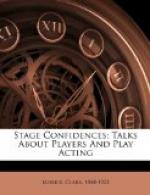I could not ignore that last appeal. What my answer was you will not care to know; but if it was brief, it was at least not flippant; and before writing it, I, in my turn, appealed for help, only my appeal was made upon my knees to the Great Authority.
* * * * *
On election nights it is customary for the manager to read or have read to the audience the returns as fast as they come in from various points, showing how the voting has gone.
[Illustration: Clara Morris and James Parselle in 3d Act of “Miss Multon"]
An election was just over, when one evening a small incident occurred during a performance of “Miss Multon” that we would gladly have dispensed with. In the quarrel scene between the two women, the first and supposedly dead wife, in her character of governess to her own children, is goaded by the second wife into such a passion that she finally throws off all concealment and declares her true character and name.
The scene was a strong one, and was always looked forward to eagerly by the audience.
On the evening I speak of the house was packed almost to suffocation. The other characters in the play had withdrawn, and for the first time the two women were alone together. Both keyed up almost to the breaking point, we faced each other, and there was a dead, I might almost say a deadly pause before either spoke.
It was very effective—that silence before the storm. People would lean forward and fairly hold their breath, feeling there was a death struggle coming. And just at that very moment of tensest feeling, as we two women silently measured each other, a man’s voice clearly and exultantly declared:—
“Well, now, we’ll get the returns read, I reckon.”
In one instant the whole house was in a roar of laughter. Under cover of the noise I said to my companion, who was showing her annoyance, “Keep still! keep still!”
And as we stood there like statues, utterly ignoring the interruption, there was a sudden outbreak of hissing, and the laughter stopped as suddenly as it had burst out, and our scene went on, receiving even more than its usual meed of applause. But when the curtain had fallen, I had my own laugh; for it was funny, very funny.
In Boston there was an interruption of a different nature. It was at a matinee performance. There were tear-wet faces everywhere you looked. The last act was on. I was slipping to my knees in my vain entreaty to be allowed to see my children as their mother, not merely as their dying governess, when a tall, slim, black-robed woman rose up in the parquet. She flung out her arms in a superb gesture, and in a voice of piercing anguish cried:—
“For God’s sake, let her have her children! I’ve lived through such loss, but she can’t; it will kill her!”
Tears sprang to the eyes of every one on the stage, and there was a perceptible halt in the movement of the play. And when, at the death scene, a lady was carried out in a faint, we were none of us surprised to hear it was she who had so far forgotten where she was as to make that passionate plea for a woman whose suffering was probably but a faint reflection of her own.




